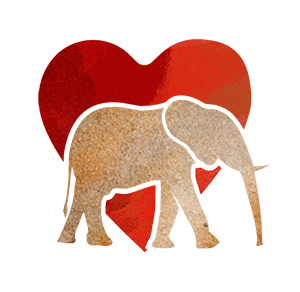Mzinga is alive today because of a fortuitous chance sighting. On 9th February 2022, our Tsavo Works Manager rounded out a long day in the field with an evening patrol of the Voi pipeline. Driving along the remote, dusty road, he spotted a tiny elephant up near Msinga Hill. She was all alone, dwarfed by the vast wilderness surrounding her.
Elephants are a common sight on Msinga Hill. More than half a century ago, David and Daphne built the original Voi stockades at the base of the hill, and the Voi orphans continue to spend their days on its slopes. Given its proximity to the Mzima Springs pipeline, with its breather outlets spewing water into heavily trafficked watering points, Msinga Hill is a favoured haunt for wild elephants, from family herds to solo travellers. It also attracts its fair share of other species, particularly the opportunistic predators.
On this particular evening, however, our Works Manager could tell that something was very wrong with this picture. The calf was tiny — no more than a month or two old — and utterly alone. It would be very unusual for a baby of this age to be unaccompanied, even for a few minutes, and there were no family herds in the area. More support was called in to comb the area for any nearby elephants, but with the open grasslands stretching as far as the eye could see, there was no mistaking that this baby was utterly alone.
We do not know what happened to the calf’s mother or why she was left alone. No elephant carcass were found in the immediate area, and given that the calf was found in the heart of the Park, human-wildlife conflict was an unlikely culprit. Possibly, her mother died elsewhere and she trailed a herd until eventually dropping from their ranks at Msinga Hill. Perplexingly, she was in good condition, unlike so many orphans who spent days without their mother’s milk before being rescued..
We named the calf Mzinga, as a homage to her rescue location. Fortunately, her diminutive size made it relatively easy to save her life. Because it was abundantly clear that she was an orphan, the KWS warden greenlit a rescue and we set the wheels in motion. As our Voi Keepers mobilised to the scene, our Works Manager approached the little calf and manually restrained her. Again, all this was relatively easy – even an infant elephant packs a serious punch!
The hour was late, so the team whisked Mzinga directly to the Voi stockades, where she was placed under close supervision for the night. Mbegu, Tagwa, Tamiyoi, and the other orphans comforted her with a chorus of rumbles throughout the evening, assuring her that she was in safe hands now.
At first light the following morning, the SWT helicopter scooped up Mzinga and flew her to our Nairobi Nursery, the place she would call home for the next three years. Almost immediately, we had the dreaded teething stage to navigate. This is a notoriously difficult time for any infant orphaned elephant, as teething puts enormous stress on their little bodies. This, combined with the inevitable loss of condition, created a very precarious situation for little Mzinga.
However, we quickly learned that Mzinga is a fighter. Even as her cheeks hollowed out and her condition dipped, her spirit never wavered. When the Keepers led her on short walks around the compound, she resolutely strode alongside them, her trunk swinging and ears alert. On days when she was visibly struggling, her bright eyes showed that she was determined to survive.
By the time her final molar popped through, Mzinga was ready to blossom. Swaddled in her colourful blanket, she paddles around the Nursery with the confidence of a much bigger elephant. Another equally young orphan was rescued shortly after her arrival, and she quickly became her little mentor. It is too early to tell, but we suspect Mzinga might become a mini matriarch in the fullness of time. But for now, she is the queen bee of the ‘blanket brigade.’































